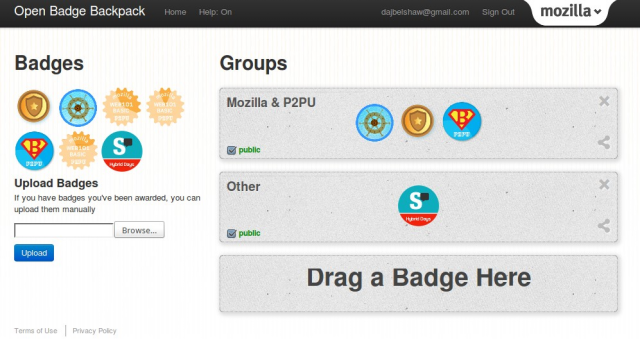Getting up to speed on the technical side of #openbadges

Today is my first day of work at the Mozilla Foundation as ‘Badges & Skills Lead’. I’ve been evangelising Open Badges for about the last year but have very much focused on the disruptive and pedagogical aspects rather than the technical side of things.*
Given that Mozilla very much encourage you to ‘think out loud’ and over-share, here goes my attempt at getting my head around the technical side of the Open Badge Infrastructure (OBI):
The specification found here defines the information, or metadata, that must be included in a badge for it to be considered OBI-compliant. Each Open Badge carries all the information needed to understand that badge as it is transferred throughout the ecosystem. This includes how it was earned, where it was earned, who earned it, if and when it expires, etc. The specification ensures that badges are interoperable with other Open Badges and Badge Backpacks. The Open Badges metadata specification is available under a set of open licenses.
So badges are images that have the metadata encoded into that image. The process of encoding that metadata is called ‘baking’ and Mozilla are doing this on behalf of issuers during the beta period.
OpenBadger is an OBI-compliant badge issuing system that will be ready towards the end of 2012. Right now, though, because the OBI is an open specification, others are available such as badg.us. These are fairly straightforward and easy-to-use if you want to get started issuing badges.

Badges are currently displayed through Mozilla’s Open Badges backpack:
A repository for collecting and displaying badges from a variety of sources, the Badge Backpack is a user management interface where the Earner can delete badges, import badges, set privacy controls, create and publish groups of badges, etc. Eventually, many entities may choose to host Badge Backpacks, but to start, Mozilla is hosting a reference Backpack (the “Mozilla Badge Backpack”) that can be used as a model for other Backpack Providers.
I’ve dragged some of the Open Badges I’ve been awarded into the groups shown in the image above. In addition, I’ve made each group public so here, for example, is my Mozilla & P2PU badges portfolio page.
You may have noticed that I’ve currently got some Open Badges embedded in the sidebar of this blog. I used Dave Wiley’s BadgeWidgetHack to do that, but this will get easier over time through WordPress plugins and the like.
The thing I didn’t get at first was the link between an individual’s email address and their badges. For example, my Hybrid Days key speaker badge was created for my old JISC infoNet email address and so I asked the issuer to re-create it for my personal email address. I could, however, have added my JISC infoNet email address to BrowserID account.
Finally, when it comes to UK educational institutions, I’m going to have to do some research. The Open Badges FAQ states the following to comply with the United States FERPA (privacy) legislation:
If you are an educational institution, the criteria for earning badges may list required grades or minimum grades but the badge itself may not contain any information indicating the actual grade received by that Earner. For more information, see the FERPA FAQ.
I’m not sure that applies over here?
Additionally, the United States COPPA legislation means that the Open Badges aren’t designed for those under the age of 13:
The Mozilla Badge Backpack is not available to users under the age of 13. If you have users under 13 who are earning badges, then do not allow those users to push badges to the Mozilla Badge Backpack.
However, it’s entirely possible to circumvent this by building your own backpack for use within an educational institutions.
Open Source FTW.
Image CC BY-NC-SA Daniel*1977
*I should probably explain that there’s a whole Open Badges team and everyone’s a ‘Lead’. You might want to follow Planet OpenBadges if you’re interested in this stuff – my blog posts will begin to appear there soon!


Hey Doug,
I noticed that when I click on your badge, your identification is your email address. What if everyone were given their life-long 5 letter code? The badges could have that code on them, making them unique to the owner, and with all other verification being the same you won’t have to share something as personal as an email address.
Perhaps I don’t know enough about this, but just thinking out loud.
Dave.
Hi David, thanks for the comment.
I know what you mean and I’ve read lots of discussions about this. I’m sure something like this will eventually be the norm, it’s just that everyone understands email addresses!
There seems to be a lag in law (data protection act) and practice. An expert (cf Judgement has been handed down or research says) in London said that as long as you cannot nail an individual on data stored offshore (ie outside Europe) its ok. Clearly FaceBook is on dodgy ground as it is perceived that it has personal data in downtown Des Moines (or where-ever). But I cannot see Mark Z being extradited to Brussels on the matter so the issue is really a strawman.
I’m still very keen to develop a badge for 100 Word Challenge so will be watching this space (&others) with keen interest!
Julia Skinner
Hi Julia, why not have a go with http://badg.us and see how you get on? 🙂
Will do! Thanks Doug & have a great first ‘official’ day!